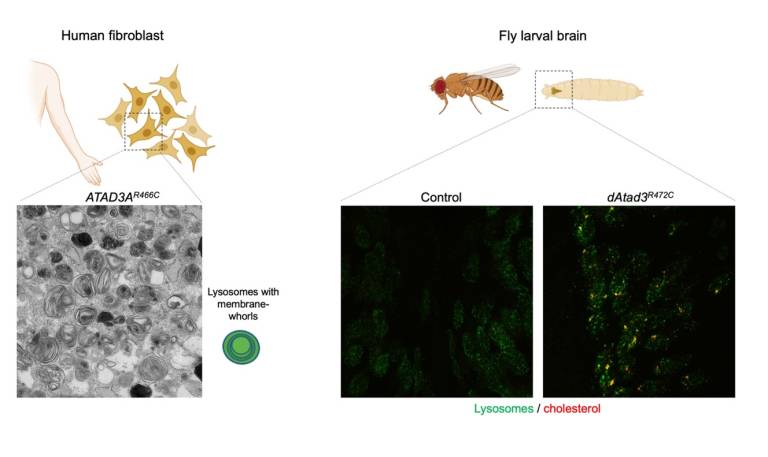New research marks a step change in understanding relationship between cholesterol and mitochondria
15 February 2024
Researchers at the UCL Queen Square Institute of Neurology have discovered that the response to cholesterol scarcity in the cells’ energy factories, the mitochondria, causes problems commonly associated with neurodegenerative diseases.

Cholesterol, despite its bad reputation, is an essential component of our body, because it helps to maintain the flexibility and the integrity of cell membranes.
In 2017*, UCL Queen Square Institute of Neurology scientists discovered that cholesterol metabolism is drastically altered in one specific form of mitochondrial disease where brain and heart are severely affected; yet, why this occurs was not known. Addressing this question was crucial as cholesterol and mitochondria are heavily implicated in neurodegeneration and heart disease.
The new study reveals that the cholesterol in the mitochondria, although minimal, is essential, so that when mitochondria cannot obtain the cholesterol they need, the entire cell responds by increasing free cholesterol levels. However, this protective mechanism to save the mitochondria comes at a high price: the excess cholesterol aggregates in membranes and then clogs up the cell’s recycling machinery (See Figure). The recycling problem potentially contributes to neurodegeneration, as similar recycling defects are implicated in various neurological conditions.
The research marks a step change in understanding the intricate relationship between cholesterol and mitochondria for human health. The UCL Queen Square Institute of Neurology team now plan to study the coupling of cholesterol and mitochondrial metabolism across the spectrum of neurological and neurodegenerative diseases.
Any changes identified could serve as markers of disease development and progression, as well as suggesting treatments to implement or to avoid.
"These findings shed light on how disruption of the cholesterol-mitochondrial axis contributes to a range of neurological diseases, in which both cholesterol and mitochondria play a role. Targeting the cholesterol-mitochondrial axis can lead to new therapies for neurological disorders." Corresponding authors, Professor Antonella Spinazzola, Clinical and Movement Neurosciences, UCL Queen Square Institute of Neurology, and Ian Holt, Ikerbasque Professor and Honorary Professor at UCL Queen Square Institute of Neurology.
Professor Mike Hanna, Director of UCL Queen Square Institute of Neurology commented: “The Institute of Neurology has been world leading in identifying how defects in mitochondria cause neurological disease. This new research shows that defective mitochondria can alter cholesterol metabolism as a new mechanism causing neurological disease”.
Professor Tony Schapira, Head of Department, Clinical and Movement Neurosciences, added: “Cholesterol is essential for the normal function of cell and organelle membranes. Disordered cholesterol function and metabolism is associated with neurodegeneration, for instance through ApoE4 status in Alzheimer’s and Parkinson’s diseases. The findings of Spinazzola and colleagues are important and provide insight into how genetically determined disruption in cholesterol metabolism can influence the lysosome-mitochondrial axis. This pathway may be amenable to manipulation to enhance or salvage organelles function in neurodegenerative diseases.’
The authors are grateful to the funders, patients and families that have supported the research leading to this achievement.
Links
- Mikel Muñoz-Oreja, et al, Elevated cholesterol in ATAD3 mutants is a compensatory mechanism that leads to membrane cholesterol aggregation, Brain, 2024, awae018
- * Desai, R. et al. ATAD3 gene cluster deletions cause cerebellar dysfunction associated with 26 altered mitochondrial DNA and cholesterol metabolism. Brain, Volume 140, Issue 6, June 2017, Pages 1595–1610.
- Professor Antonella Spinazzola's profile
- Professor Ian Holt’s profile, Ikerbasque
- Professor Ian Holt’s profile, Biodonostia
- Dr Diego Perez-Rodriguez’s profile
- Dr Matthew-Gegg’s profile
 Close
Close

